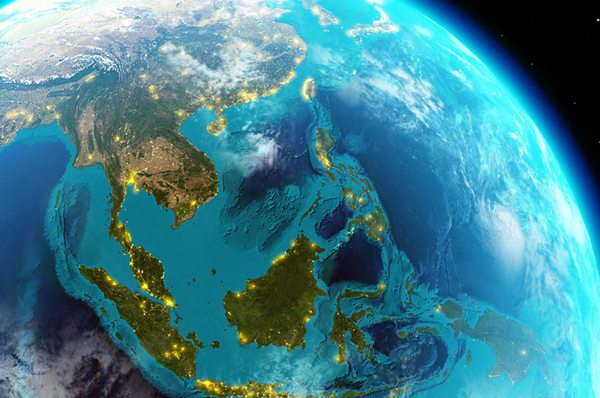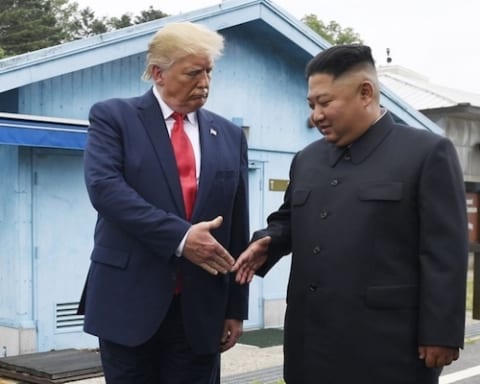|2ND of July – Lima Charlie’s South East Asia End-of-Week News Briefing:
Philippines
“I do not want to diminish his memory but he was a rotten son of a bitch.”
On Thursday JUN30, Rodrigo Roa Duterte was sworn in as the 16th President of the #Philippines. Back in May, President Duterte won a landslide victory with 16.6 million votes. He ran on a platform of change and promised to suppress crime, stop the spread of the drug trade and end corruption within 3 to 6 months of election to office.
Nicknamed “The Punisher”, Duterte—the former lawyer-turned-Mayor of Davao City—has a zero tolerance policy towards crime of any kind. In his 22 years as Mayor, Duterte transformed Davao City, once known as the “murder capital of the Philippines,” to one of the most peaceful citjes in all of Southeast Asia.
The new President, nevertheless, is not without his critics; humans rights groups claim he is responsible for extra-judicial killings of criminal gang members, drug traffickers and other lawless elements through the use of vigilante death squads, drawing reproach from these organizations around the world.
Duterte’s no nonsense approach has also drawn criticism from media organizations. In particular, his comments on media killings and the death of journalist Jun Pala have proven especially contentious. As reported by the BBC,Duterte was quoted as saying, “I do not want to diminish his memory but he was a rotten son of a bitch. He deserved it.”
The Committee to Protect Journalists (CPJ) told the BBC that his remarks ”give security officials the right to kill for acts that they consider defamation”.
The Philippines is one of the most dangerous places for journalists to work. According to CPJ, since 1992, 75 journalists have been murdered.
Despite tough talk—he himself admits that “sometimes my mouth can get the better of me”—Duterte is ready to take up the reins of the Philippines and tackle some of the toughest issues facing the nation. He plans to go after corruption and reform bureaucracy in government on all levels. He also advocates transparency, something that is often missing within the government hierarchy.
Duterte has set out a 10-point economic plan to revitalize the Philippine economy, infrastructure, social services and rural development. He has also vowed to do more to attract foreign investment.
“The Philippines will not be dependent on America,” he stated, adding that making a pact with the US “ will be charting a course on its own”.
In his fifteen-minute inaugural speech, Duterte sent a strong message to his critics and supporters with a quote from 16th President of the United States, Abraham Lincoln:
“You cannot strengthen the weak by weakening the strong; you cannot help the poor by discouraging the rich; you cannot help the wage earner by pulling down the wage payer; you cannot further the brotherhood by inciting class hatred among men.”
Duterte also drew lines from President Franklin D. Roosevelt, adding, “The test of our progress is not whether we add more to the abundance of those who have much; it is whether we provide enough for those who have too little.” His speech, however, made one thing very clear—he cannot create change on his own.
He called upon all citizens of the Philippines, saying, “The ride will be rough, but come and join me just the same. Together, let us take the first wobbly steps in this quest.”
Thailand
“We have a duty towards humanity. The victims are human. Don’t you feel sorry for them? This must stop.”
This week, the US Department of State released its annual Trafficking in Persons (TIP) Report in Washington, DC. For the first time in three years, #Thailand has been upgraded from Tier 3, to Tier 2 on the watch list.
The US embassy in #Bangkok released a statement saying, “The Tier 2 Watch List ranking indicates that the Government of Thailand made significant efforts to eliminate trafficking during the rating period, but still does not fully meet the minimum standards for doing so”.
The statement continued, “We encourage Thailand to make further, sustained progress in fighting trafficking and enforcing Thai anti-trafficking laws”.
Meanwhile, Thailand’s Prime Minister, General Prayut Chan-o-cha, humbly accepted the upgrade and was quoted in the Bangkok Post as saying, “We also have a duty towards humanity. The victims are also human. Don’t you feel sorry for them? This [human trafficking] must stop.”
Nevertheless, the TIP report was not welcomed by all. The International Labor Rights Forum issued a letter to Secretary of State, John Kerry, criticizing the move. The letter read, “It is our view that this move is premature and could undermine international efforts to significantly and permanently improve working conditions among migrant workers in Thailand, including those in the fishing and seafood processing sectors”.
According to Thai newspaper, “The Nation” Prime Minister General Prayut reportedly said, “Whatever status we have been given, we have to do the job. If I can’t complete the mission, the next government must carry on.”
The 408-page TIP report downgraded Burma to Tier 3, meaning that Burma “did not meet the minimum standards and did not make any significant efforts to do so.” According to US Officials, the upgrade was extended as a catalyst to prod the country’s new democratically elected government and its still-powerful military to do more to curb the use of child soldiers and forced labor.
This move by the US Department of State could have some serious negative consequences on US-Burma relations. A Tier 3 rating could prompt sanctions or halt the easing of sanctions, an action which has been taking place. It could also harm the US’s efforts to seek Southeast Asian unity against #China in the South China Sea and push #Burma back into China’s influence.
Vietnam
After months of hundreds of tons of fish washing ashore in four central #Vietnamese provinces, The #Taiwanese company, Formosa Ha Tinh Steel Corp. (FHS), has apologized for causing one of the worst environmental disasters in recent Vietnamese history.
According to Thanh Nien News, the FHS has promised to pay $500 million USD in compensation.
In April, when thousands of fish started washing up on shore in the provinces Hà Tính, Quang Binh, Quang Tri and Thua Thien-Hue, The Ministry of Natural Resources and Environment launched a preliminary investigation, mistakenly believing that the incident was caused by human activity and red tide algal blooms.
When their studies determined it was not human waste or red tide, The Ministry of Natural Resources and Environment then invited experts from Germany, Japan, the US, and Israel to participate in the investigation.
The findings stated that the fish had died from industrial waste containing a combination of phenol, cyanide and iron hydroxides.
Thanh Nien also reported that the Minister, Mai Tien Dung, Chairman of the Office of the Government, said that the VND11.5 trillion (US$500 million) will be used to compensate local people’s economic losses, supporting them to find new jobs and also treat polluted sea environments.
In a letter made public, Yuan-Cheng Chuan, chairman of FHS, wrote, “We respect the government’s investigation results and are cooperating with the authorities to handle and mitigate the consequences”.
Burma
Burmese State Counselor and Foreign Minister, Aung San Suu Kyi, made an official state visit to Thailand last week, a trip which got off to a rocky start due to bad weather and poor planning.
On JUN23, thousands of #Burmese migrant workers showed up at a seafood market in Mahachai to hear Suu Kyi speak, but due to poor planning and bad weather, many were turned away, leaving many Burmese migrant workers feeling rejected. The incident forced Suu Kyi to issue an apology via Facebook.
On the same day, Suu Kyi was forced to abandon her plans to visit a Burmese refugee camp at Ban Tham Hin in the Ratchaburi province on Saturday after a potential for bad weather raised safety concerns.
However, despite disappointing many fans and fellow compatriots, Suu Kyi’s visit last week led to some very positive developments in the areas of bilateral trade, repatriation of refugees, and ensuring protections for Burmese migrant workers in Thailand
According to an Irrawaddy report, the Burmese President’s Office announced on Wednesday that Burmese and Thai governments have agreed to boost bilateral trade from $6 billion dollars to $20 billion in 2017.
The announcement was made after President Htin Kyaw met Thailand’s Deputy Prime Minister Tanasak Patimapragorn and Minister of Defense Gen Prawit Wongsuwon on Wednesday in Naypyidaw.
Than Win, director of the Ministry of Commerce, said, “We can reach the target of $20 billion in 2017 if both governments open more border trading posts and crack down on the informal trade”.
Thailand and Burma currently have four official border crossings with a fifth crossing being negotiated in the Mese Township, Karenni State.
Burma mainly exports agricultural and marine products to Thailand and imports electronics, foods, beverages, and agricultural equipment.
Another positive outcome emerged from last week’s official state visits: Aung San Suu Kyi promise to help repatriate thousands of displaced people back to Burma, and is making moves to deliver on that pledge.
However, official dates for repatriation have not yet been set. Prime Minister, Prayut Chan-o-cha, stressed that it would only begin if “the situation is right”, according to Democratic Voice of Burma.
There are currently between 100,000 and 120,000 Burmese refugees in nine camps along the Thailand/Burmese border.
The Bangkok Post reported that authorities in Burma will begin the process of checking documents of Burmese refugees residing in Thailand, in order to start repatriation.
Malaysia
The New Straits Times recently reported that sexual predators in #Malaysia are increasingly targeting children and adolescents via social media.
The social media site of choice is WeChat, a text and voice messaging communication service developed by Tencent in China and first released in 2011.
The Federal Police’s Sexual, Women and Children’s Investigation (D11) Principal Assistant Commissioner Ong Chin Lan, told the New Straits Times that the trend of targeting children through social media cannot be ignored.
Out of 184 child rape cases last year, WeChat was used in 138. Ong Chin Lan said, “These culprits have exploited the ease with which social media enables one to make new friends, as a tool to prey on children.”
“Statistics show that children who are between 13 and 15 years old are more prone to becoming victims as they make new friends on social media,” Ong continued.
Ong told New Straits Times that, so far this year, police have received 63 cases of child targeting via social media. Of this total, WeChat was used in 47 cases, Facebook for 12 cases, WhatsApp, 3, and Beetalk, 1. Ong went on to say the perpetrators’ modus operandi was simple: make friends with the children, convince them to meet, and then prey on their vulnerabilities to rape them.
+++ End
For up-to-date news about South East Asia, please join us on Twitter at @LimaCharlieNews
Lima Charlie provides global news, analysis and opinion by military veterans and service members Worldwide.
#SEAsia #SouthEastAsia #ASEANNews #ASEAN #LimaCharlie #LimaCharlieNews
[@LimaCharlieNews, with Special Ops by RP and Nikita Roach]




![A Trump war crime pardon dishonors us all [Lima Charlie News]](https://limacharlienews.com/wp-content/uploads/2019/05/A-Trump-war-crime-pardon-dishonors-us-all-Lima-Charlie-News-480x384.png)

![Blossoming Russo-Turkish alliance leaves U.S., NATO behind [Lima Charlie News]](https://limacharlienews.com/wp-content/uploads/2019/07/Russia-Turkey-alliance-leaves-U.S.-NATO-behind-480x384.png)



